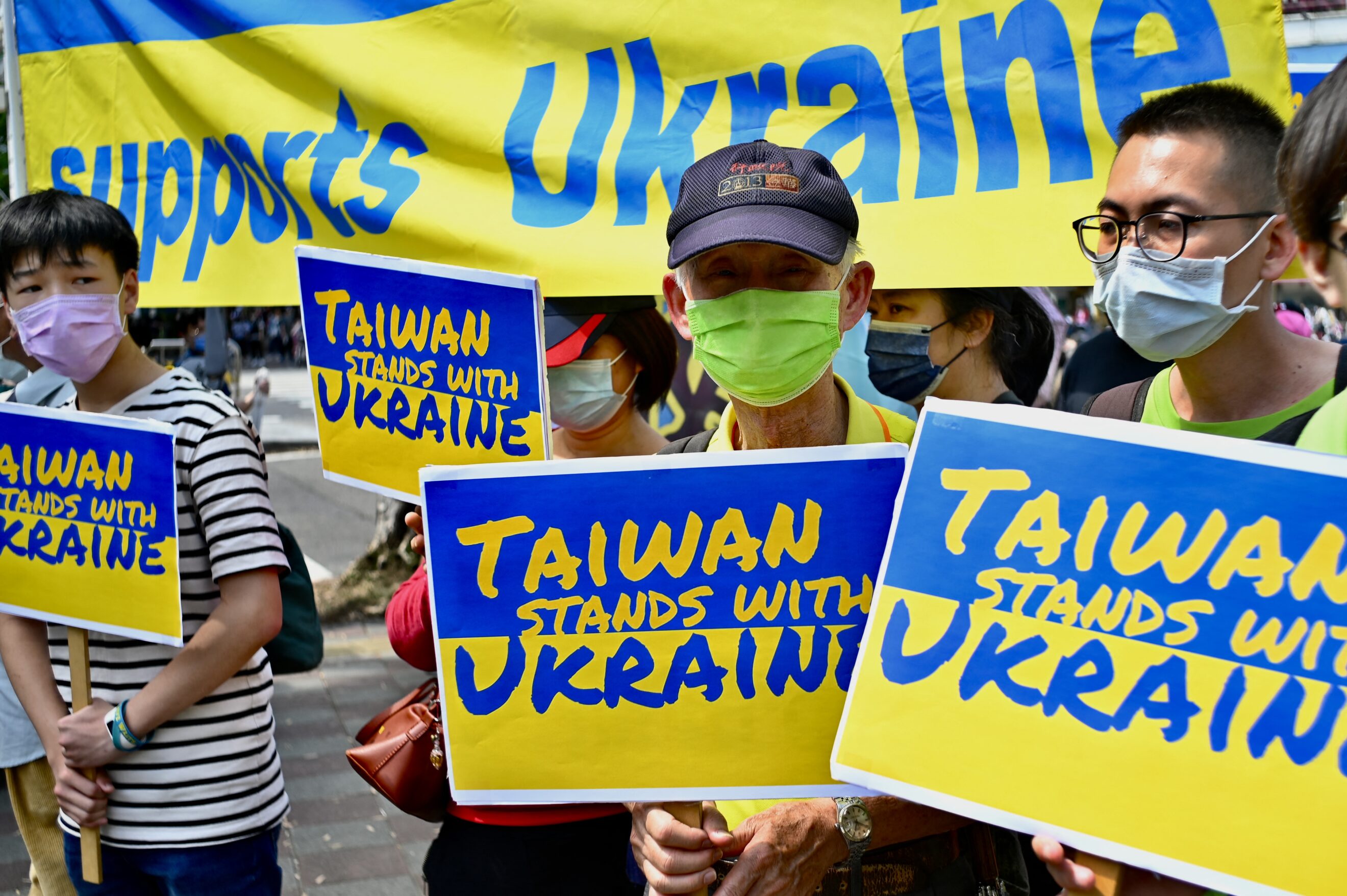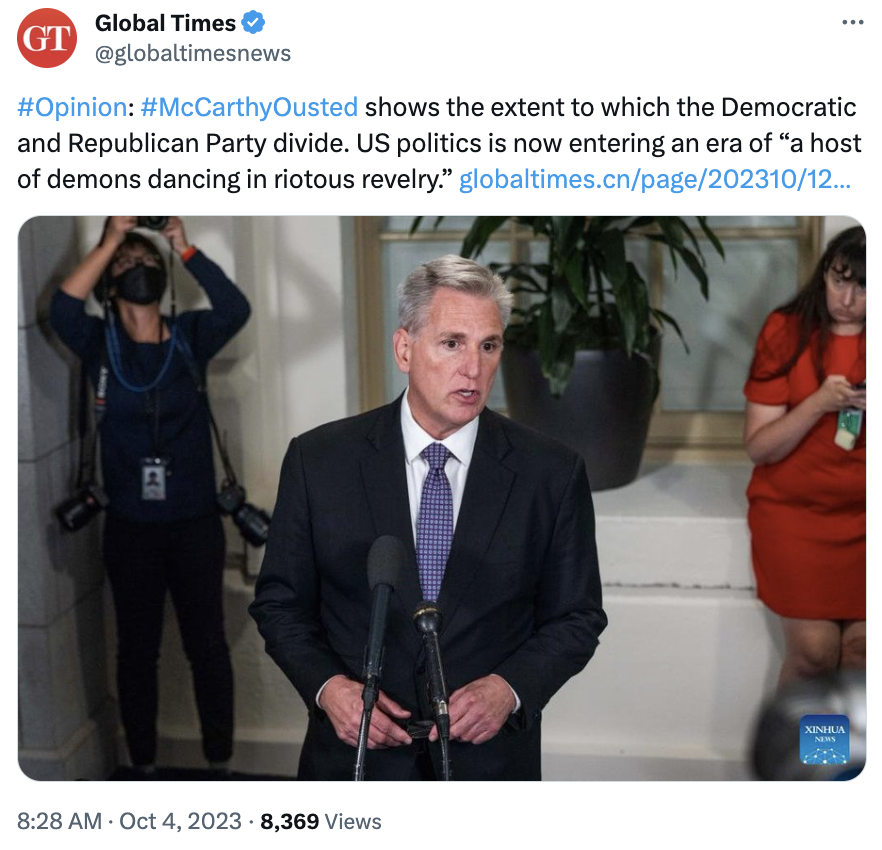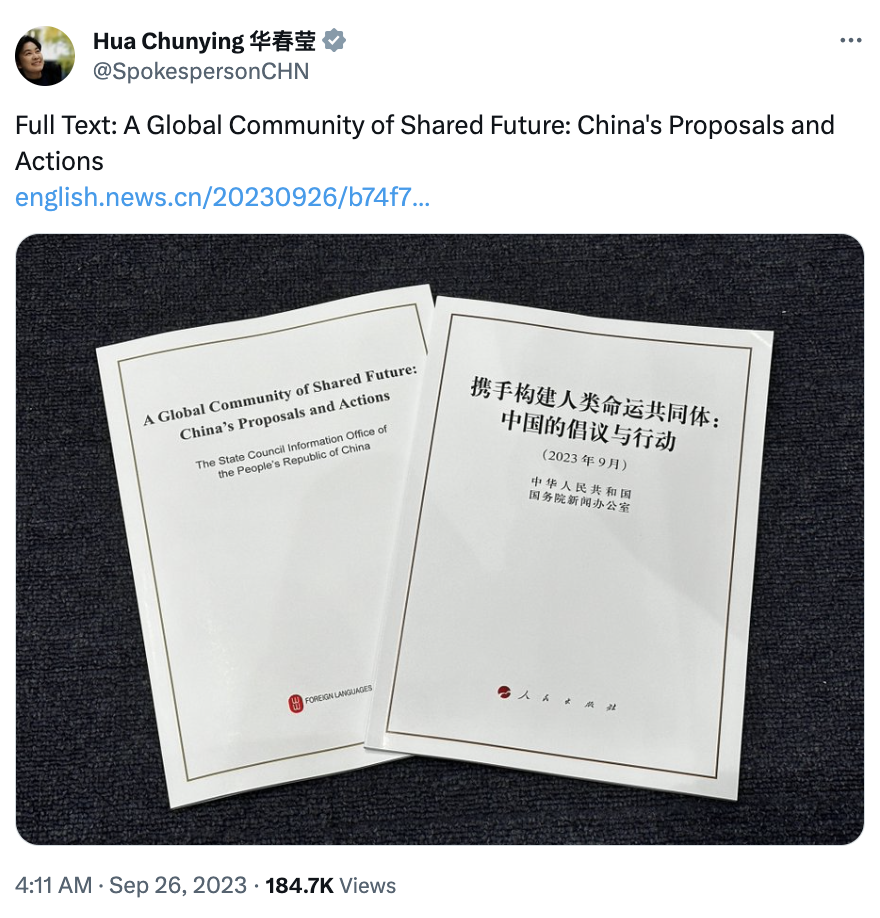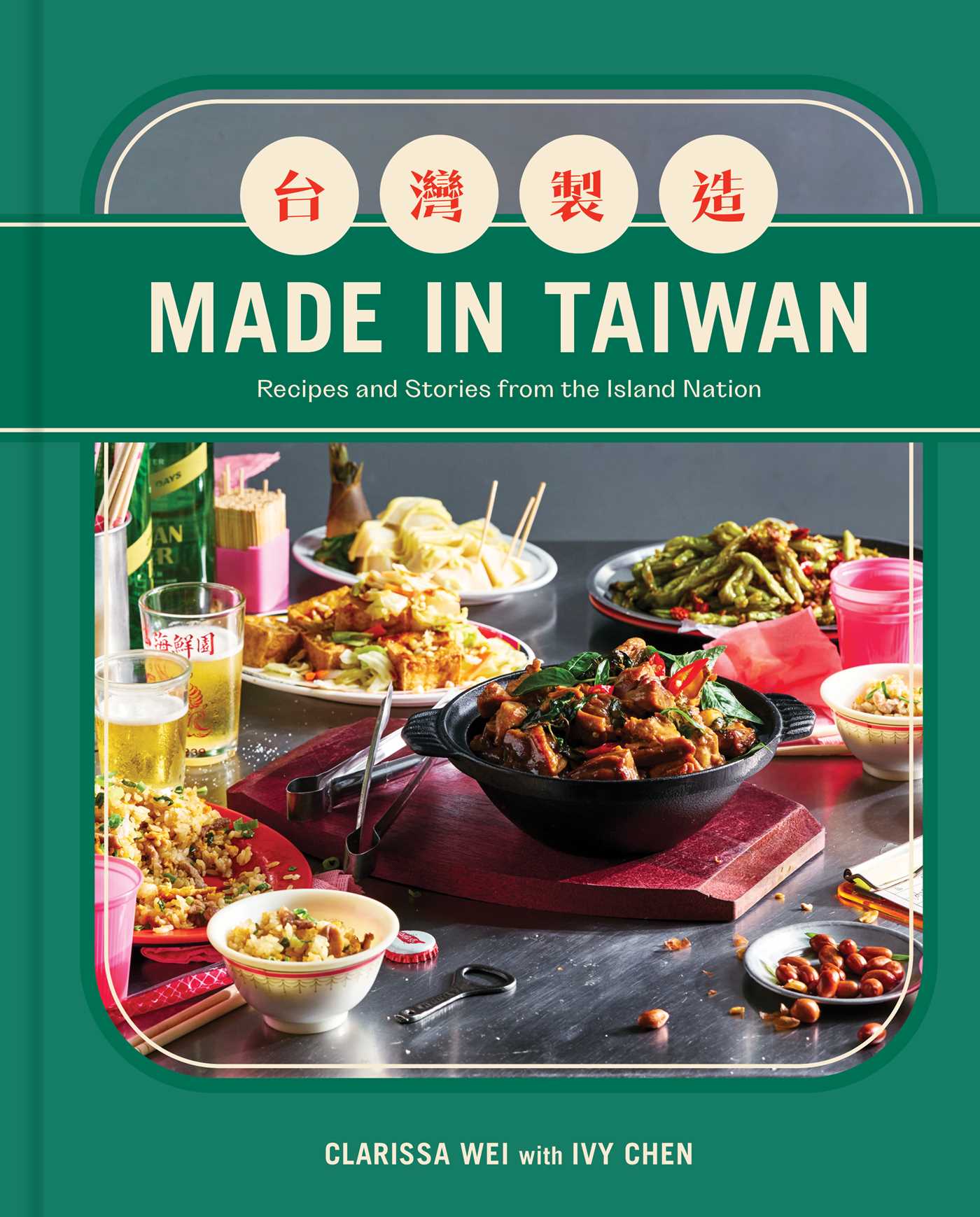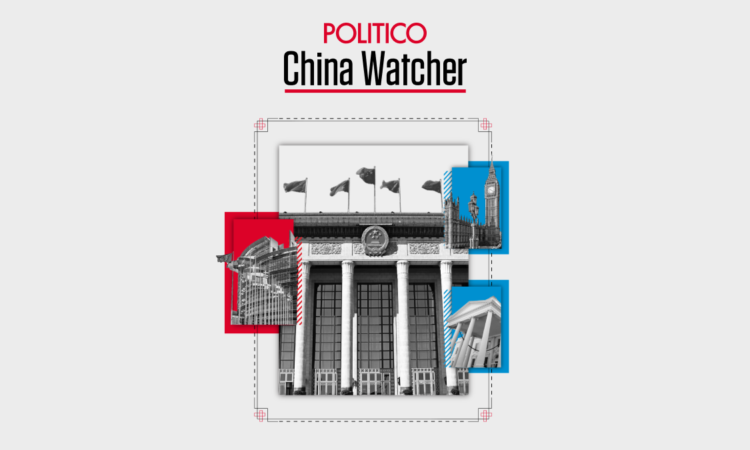
Press play to listen to this article
Voiced by artificial intelligence.
 |
By PHELIM KINE
with STUART LAU
Send tips here | Tweet @PhelimKine or @StuartKLau | Subscribe for free | View in your browser
Hi, China Watchers. Today we probe the fallout in Taiwan from the last-minute U.S. government funding deal and examine how Beijing’s exit bans against foreign executives are worsening already shaky U.S. business sentiment. And ahead of Taiwan’s national day celebrations next week, we profile a book that blends classic Taiwanese recipes with a crash course in the self-governing island’s history.
Let’s get to it. — Phelim
|
Protesters at a rally in Taipei on March 13, 2022 | Sam Yeh/AFP via Getty Images |
U.S. pause in Ukraine funding spooks Taiwan
The congressional deal that averted a U.S. government shutdown on Saturday didn’t include funds for more aid to Ukraine — a move that raised alarm not just in Kyiv, but also five time zones away in Taipei.
Taiwan is already worried about the durability of U.S. support to fortify the self-governing island from Chinese aggression. And the congressional retreat from funding Kyiv is a boon for Beijing’s efforts to sow doubt among Taiwan’s electorate about U.S. reliability ahead of the January presidential election.
The suspension of Ukraine aid helps feed “this notion of American skepticism in Taiwan that has been spreading for quite some time,” said Jason Hsu, former legislator-at-large for Taiwan’s opposition KMT, or Nationalist party, and a visiting fellow at Yale Law School’s Paul Tsai China Center.
Ukraine-Taiwan tango. Washington’s willingness to fund Ukraine’s defense has become synonymous with U.S. resolve to oppose Beijing’s rising belligerence toward Taiwan. Taiwan’s President Tsai Ing-wen declared in March that Russia’s invasion of Ukraine was a global “wake-up call” to the dangers of authoritarian aggression and compared that conflict to the threat that China poses to the self-governing island.
Talk is cheap. So President Joe Biden’s struggle with Congress to deliver on his pledge to support Ukraine “as long as it takes” to beat back Russia is unsettling for Taipei. And adds to its concerns about lengthy delays in weapons deliveries.
Taiwan should beware “relying too much on a few assurances, given the general shambolic direction of policy in Congress, even in an atmosphere of bipartisan hostility to China,” said Douglas Paal, who was director of the State Department’s American Institute in Taiwan under President George W. Bush.
The White House didn’t respond to a request for comment and Taiwan’s diplomatic outpost in Washington declined to comment.
Beijing calling. China is stoking those insecurities with a disinformation campaign aimed to undermine Taiwan’s public trust in both the U.S. and Taiwanese political parties seeking closer U.S. ties in the face of Chinese intimidation.
Beijing wants to convince Taiwanese voters “that the United States is not trustworthy, that the United States is not genuine in helping Taiwan, … that at the end, it’ll be Taiwan who suffers just like the Ukrainians who suffer from the Russian invasion,” Taiwan’s Foreign Minister Joseph Wu told reporters last week.
Domino theory. Taiwan’s backers on Capitol Hill have also been making the Ukraine connection. Defunding Ukraine’s defense “is a death sentence for Taiwan. … If Ukraine can beat Russia, China’s less likely to invade Taiwan,” Sen. Lindsey Graham (R-S.C.) told CBS News’ Meet the Press on Sunday. Beijing’s scrutiny of U.S. resolve in defying Russian President Vladimir Putin means “a vote against supporting Ukraine is a vote against supporting Taiwan,” said Rep. Jake Auchincloss (D-Mass.), a member of the House Select Committee on China.
Letter of the law. Still, the Taiwan Relations Act, which commits the U.S. “to resist any resort to force or other forms of coercion,” may be the best guarantor of U.S. willingness to defend the island — regardless of what happens elsewhere.
China’s exit bans stoke foreign business blues
Beijing has kneecapped its recent efforts to woo U.S. investors to boost China’s sputtering economy by imposing an exit ban on yet another foreign firm’s executive.
The latest victim is Hong Konger Michael Chan, a senior executive at the U.S. risk consultancy firm Kroll, who Chinese authorities have barred from leaving China indefinitely as part of a government probe, per the Wall Street Journal last week.
Dozens barred from leaving. Data compiled by the nonprofit prisoner advocacy organization Dui Hua Foundation suggests that there are at least 30-40 U.S. citizens — 90 percent of whom are business executives or their relatives — stuck in China under exit bans that offer no appeal process. Other high profile exit ban targets include Hong Kong’s Charles Wang Zhonghe, China investment banking chair at Tokyo-based Nomura Holdings, and California native Henry Cai, who will mark his sixth year under an exit ban in December. The State Department advises U.S. citizens “reconsider travel” to China because of exit ban risks.
Confidence crisis. That spooks even longtime boosters of bilateral economic ties. “Of my friends working in China, nobody thinks the exit bans would apply to them or that they would be involved in some kind of investigation. Until they are,” said Ker Gibbs, former president of the American Chamber of Commerce in Shanghai from 2019 to 2021.
Business deterrent. That pummels Beijing’s campaign to rejuvenate U.S.-China business ties during recent visits by Treasury Secretary Janet Yellen and Commerce Secretary Gina Raimondo. Those trips produced various working groups to address bilateral commercial issues, but didn’t protect individual U.S. businesspeople from China’s rule of law deficit.
Lawmakers alarmed. That’s prompting bipartisan criticism on Capitol Hill. “Actions like exit bans … are why some business leaders have told Secretary Raimondo that the PRC is becoming ‘uninvestable,’” said Raja Krishnamoorthi (D-Ill.), ranking member of the House Select Committee on China. Exit bans underscore that “there is no such thing as a private company or rule of law in China,” said Mike Gallagher (R-Wis.), the committee’s chair. Beijing calls that alarmist. “Companies that run lawfully shall have nothing to worry about,” said Chinese embassy spokesperson Liu Pengyu.
Corporate concern. Foreign companies in China are taking action to mitigate the risk of exit bans.
“It is now a calculated decision to put an expat in mainland China,” said Dale Buckner, chief executive officer of the corporate security firm Global Guardian.
TRANSLATING WASHINGTON
— DOJ INDICTS FENTANYL-LINKED CHINESE FIRMS: The Department of Justice announced indictments on Tuesday of eight Chinese chemical firms and 12 Chinese citizens linked to shipments of precursor chemicals that Mexican cartels process into synthetic opioids. “We know that the global fentanyl supply chain, which ends with the deaths of Americans, often starts with chemical companies in China,” Attorney General Merrick Garland said in a statement. The indictments reflect the Biden administration’s “scapegoating China through the tactics of sanctioning, smear and slander,” Chinese embassy spokesperson Liu said in response.
— LAWMAKERS PROBE NBA FORCED LABOR LINKS: The bipartisan Congressional Executive Commission on China wants answers from the National Basketball Association and the National Basketball Players Association about their potential links to forced labor in China’s Xinjiang region. The commission urged the NBA to “bar the sale of NBA-branded gear or garments … made with forced labor or made by sportswear companies that endorse the use of materials from Xinjiang,” co-chairs Rep. Chris Smith (R-N.J.) and Sen. Jeff Merkley (D-Ore.) said in a letter to NBA Commissioner Adam Silver published on Tuesday. Smith and Merkley called for NBPA President C.J. McCollum to “help educate players on the risks in endorsing forced labor-made gear and shoes, as well as the link between them and genocide in China,” in a separate letter published on Tuesday. “We received the letter and are reviewing it,” NBA spokesperson Mike Bass told China Watcher. The NBPA didn’t respond to a request for comment.
TRANSLATING EUROPE
KYIV GETS SERIOUS ABOUT BEIJING-MOSCOW TIES: Ukrainian authorities have designated China’s top three state-run oil giants as “international sponsors of war,” a departure from their long-held strategic tolerance over China’s business ties with Russia. In a statement Tuesday, Ukraine’s National Agency on Corruption Prevention confirmed that China National Offshore Oil Corporation, China Petrochemical Corporation and China National Petroleum Corporation had been put on the list, giving their role in “paying significant taxes” to the Russian state. Gabriel Gavin has the story.
Ex-NATO boss says Kyiv is divided on China: Former NATO Secretary General Anders Fogh Rasmussen told Stuart that the Ukrainians “are as concerned about the Chinese relationship with Russia as we are.” But, he added, there’s still a lot of benefit of the doubt as Ukraine sees China as “an efficient tool to try to pressure on Russia.”
“Personally, I do not count on Chinese pressure on Russia because [of] their determination to try to reduce the influence of the U.S. and its allies around the world,” he said.
CHINA HITS BACK AT EU’S EV PROBE: China’s diplomatic spat with the European Union escalated on Wednesday, when Beijing reacted strongly to the EU’s formal launch of the anti-subsidy probe into electric vehicles made in China. Accusing Brussels of giving it “an extremely short period” for consultations without providing “valid materials,” the Chinese Ministry of Commerce said that the EU probe was based on “subjective presumptions.” The EU, for now, is standing firm on its allegations. European Commission President Ursula von der Leyen said in a statement that “we will act decisively” wherever the EU finds evidence of market distortions and unfair competition, adding: “This anti-subsidy investigation will be thorough, fair, and fact-based.”
HOT FROM THE CHINA WATCHERSPHERE
— MCCARTHY’S FALL FUELS CHINESE MEDIA GLOATING: Chinese state media are spinning the ouster on Tuesday of House Speaker Kevin McCarthy as a failure of U.S. style democracy. McCarthy’s removal reflects “dysfunctional Washington” and explains “why its China policy is also deeply flawed and reckless, … very toxic,” Chen Weihua, Washington bureau chief for the English-language China Daily newspaper posted on X on Tuesday. The Global Times newspaper piled on with an opinion piece on Wednesday that described McCarthy’s downfall as “the very representation of the US’s so-called democratic politics.”
— REPORT: CHINA’S ECONOMY IN DOWNWARD SPIRAL: The recent slowdown in China’s economic growth reflects festering structural weaknesses rather than the shorter-term impact of China’s three year zero-Covid policies, according to a report by the Atlantic Council and the data analysis firm Rhodium Group published on Wednesday. “The economic malaise that policymakers in Beijing are staring down now is not caused by cyclical factors like Covid, but by a failure to reform the country’s economic system,” the report said.
TRANSLATING CHINA
— XI’S ‘SHARED FUTURE’ WANTS YOU!: China’s paramount leader Xi Jinping updated his pitch for a new China-centric international system with his “Global Community of Shared Future” proposal published by China’s State Council last week.
Its 14,000 words — part anti-U.S. screed, part propaganda re-packaging — outline Xi’s vision of a multilateral alternative to a U.S.-dominated system geared to what the Biden administration calls the “rules-based international order.”
The GCSF’s operating system: Xi’s existing signature initiatives, including the Belt and Road Initiative, the Global Development and Global Security Initiatives and his Global Civilization Initiative, are key components of the new proposal. Combined, they offer a Beijing-centered global order hinged to “universal benevolence” and the “common values of humanity embedded in Chinese civilization.” The GCSF promises a “new type of economic globalization” that can deliver both “equity and justice” and “low-carbon development.”
China Watcher tasked Sheena Chestnut Greitens, director of the Asia Policy Program at the University of Texas at Austin, and Craig Singleton, senior China fellow at the Foundation for Defense of Democracies, to distill the GCSF’s key takeaways.
It’s a recruiting tool: “Xi’s message is clear: The current, U.S.-led order has failed to bring either peace or prosperity to many developing nations, and a new order is necessary to tackle today’s issues and anticipate tomorrow’s challenges. The upcoming Belt and Road Forum, with its audience of more than 100 developing nations eager for an alternative, offers Xi the ideal stage for his grand unveiling,” said Singleton.
Democracy re-defined: “It contests democracy… not by arguing that this focus is misplaced, but that American conceptions of democracy are ‘fake.’ It’s a fascinating choice for a ruling party that is only about seven percent of China’s population, but one that may get traction in places that have clashed with the United States or other Western powers over human rights abuses or democratic backsliding,” said Greitens.
Belt and Road on steroids: “Xi Jinping’s administration appears poised to transition from merely building infrastructure to playing a larger role in shaping the governance structures of participating nations,” Singleton said.
It’s kinda fuzzy: “Beijing argues that its ‘common, inclusive’ security is a superior alternative, even if it’s not exactly clear at present how these principles actually translate into actions that make countries or people more secure,” Greitens said.
HEADLINES
The Atlantic: Telling the truth about Taiwan
Newsweek: How $1M from China-linked groups oiled New York politics
Radio Free Asia: Chinese police harass family of Washington DC student activist
HEADS UP
— SCHUMER, CRAPO CODEL BEIJING-BOUND: Senate Majority Leader Chuck Schumer (D-N.Y.) and Senate Finance Committee ranking member Mike Crapo (R-Idaho) will lead a six-member congressional delegation to Asia next week with stops in China, Japan and South Korea. The CODEL’s China agenda includes the “Chinese government’s positions on human rights, fentanyl, role in the international community and areas for potential cooperation,” said a statement released by Schumer’s office on Tuesday. “We hope this visit will contribute to a more objective understanding of China in the U.S. Congress,” China’s Foreign Ministry said in a statement on Wednesday.
ONE BOOK, THREE QUESTIONS
|
Simon Element |
The Book: Made in Taiwan: Recipes and Stories from the Island Nation
The Author: Clarissa Wei is a Taiwan-based freelance journalist and author
Responses have been edited for length and clarity.
How is this book more than just a compilation of recipes of classic Taiwanese dishes?
It’s a reflection of modern-day Taiwan, but through the lens of food.
The international perception of Taiwanese food is stuck in the late 20th century. The book includes interviews with chefs and home cooks across the island and essays on topics like why Taiwanese cuisine is so sweet and why beef was taboo on the island until just recently
What was the most surprising thing you learned while compiling this book?
That the components of the Taiwanese pantry are inherently unique to Taiwan. For example, some variants of Taiwanese soy sauce, rice wine and rice vinegar are made with recipes dating back to when Taiwan was a Japanese colony.
What role does Taiwanese cuisine play in defining a history and culture distinctive from the island’s giant — and increasingly threatening — neighbor?
Food is a form of soft power. How our cuisine is marketed and perceived goes hand in hand with how Taiwanese identity has morphed over the decades.
According to an annual survey by the National Chengchi University, 63 percent of people in Taiwan identify as Taiwanese — versus Taiwanese and Chinese, or purely Chinese. That number has more than tripled in the last 30 years. Likewise, 30 years ago, most people in Taiwan would consider Taiwanese food a subset of Chinese food, and while some people might hold that opinion today, they don’t reflect the majority.
As cross-Strait tensions build, so does the sense of a distinct Taiwanese identity and a growing pride in Taiwanese cuisine as a unique and diverse culinary tradition separate from that of China.
Got a book to recommend? Tell me about it at [email protected].
Thanks to: Heidi Vogt, Gabriel Gavin and digital producers Tara Gnewikow and Fiona Lally. Do you have tips? Chinese-language stories we might have missed? Would you like to contribute to China Watcher or comment on this week’s items? Email us at [email protected] and [email protected].
SUBSCRIBE to the POLITICO newsletter family: Brussels Playbook | London Playbook | London Playbook PM | Playbook Paris | POLITICO Confidential | Sunday Crunch | EU Influence | London Influence | Digital Bridge | China Watcher | Berlin Bulletin | D.C. Playbook | D.C. Influence | All our POLITICO Pro policy morning newsletters

